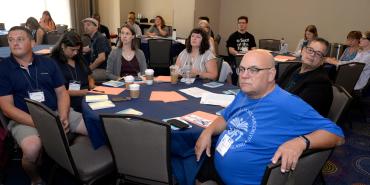When unions offer professional development, it does so much more than build capacity, said Shari Obrenski, president of the Cleveland Teachers Union, during this morning’s “Using Professional Issues to Build Institutional Strength” workshop at the AFT’s TEACH conference.
“Professional development is a gateway to building a strong union,” she said. “It is your best engagement and organizing tool; even your most reluctant member will be engaged. Ultimately, it shows the value of belonging to the union and creates better learning conditions for our students.”
There are key steps to creating professional development opportunities that engage members, said Lisa Dickinson from the AFT Educational Issues Department, who led the session.
“Surveying members is so important,” she said. “If they feel like they have a voice, they’re more likely to stay engaged, especially when forces are trying to get them to drop their union.”
To demonstrate her point, Dickinson polled attendees right then and there. The top two issues? Classroom discipline and educator well-being, separated by only three votes. The responses mirrored a 2022 Rand survey, which found that the majority of teachers experience stress because of students’ mental health, staff shortages generating extra work, and student behavior,
demonstrating that teachers and paraprofessionals are dealing with very similar concerns nationally.
That kind of data can be used as a basis for contract negotiations and to help build relationships, like it did in New York City. “We leafleted the community with our survey results, and then they were behind us the entire way,” a United Federation of Teachers member said.
A crucial piece of surveying is giving members a voice. “That participation, giving them the opportunity to have a voice—it means the world,” Obrenski said.
Another key step, Dickinson added, is approaching professional development as a way to improve entire systems. Attendees discussed everything from developing first-year mentorship programs to negotiating for bathroom breaks during the day, focusing on how to create an environment where teachers can do their best work and students can do their best learning.
Tiffany Dittrich, president of the White Bear Lake Teachers’ Association in Minnesota, said her union used its survey results to work with the school administration and highlight buildings that needed the most support, in addition to three key areas for improvement. The union plans to survey members again in the future to monitor results and continue guiding the district.
When unions engage in professional development, educators do better at their jobs; become more compelling advocates for themselves, their profession and their students; and create a stronger union.
As Dickinson said, “We are stronger together.”
[Melanie Boyer]

